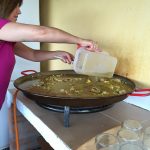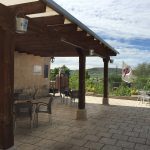Preparing for a backcountry backpacking adventure in the Porcupine Mountains? Your backcountry supply list will be the most important part to surviving the Porcupine Mountains backcountry in a comfortable fashion. The most important factors when choosing your backpacking essentials is weather and weight. (Supplies can vary based on these factors.) For shorter trips 3-5 nights, refer to the list below:
Always follow the Golden Rule, the lighter the better.
Backcountry Supply List for backpacking in the Porcupine Mountains in Fall:
[divider]Backpacking Fall Gear[/divider]
- 50+ L back pack an Osprey Ariel 55 pack for women and Osprey Aether 70 Pack would work for men.
- Light weight down sleeping bag depending on the time of year will either need a 3 season or 4. For Spring/Fall I recommend the Big Agnes Roxy Ann for women and the Big Agnes Lost Ranger for men.
- Light weight self inflatable Sleeping pad is absolutely necessary for fall/winter backpacking. Sleeping pads will keep you warm while sleeping. Do not purchase a used pad, most used pads will have a slow leak. Invest in this. They will wear and eventually need to be replaced. Make sure to purchase one that fits your sleeping bag specs. Big agnes bags feature a built in space for your pad so you will not roll off. I love this feature.
- Light weight 3 season backpacking tent. Choose one depending on one or two person. I like the Big Agnes Copper Spur HV UL 2 tent. It protects against wind and is super easy to set up. Two people fit fine with sleeping bags and pads. We even were able to bring in our packs on a day with bad weather. Very windy days did not even effect us with the tent cover.
- Mid high hiking boots. I use Keen Targhee II Mid Hiking Boot for women and for men.
- Light weight sandals for around camp
- Hiking poles – in the porcupine mountains the ground is very loose, hiking poles did come in handy.
[divider]Backpacking Cooking and Food[/divider]
- Light weight water filter for cleaning water in emergency situations. Normally you will boil your water for at least 10 min. This is for emergencies. I did not have to use this, I was abe to boil my water whenever needed. I made sure to boil enough water after dinner to fill my water bottles for the next day.
- Extra water bottle – Nalgene 32 oz – use your camel pack while hiking.
- Mini stove and fuel – purchase any single fuel canister
- Light weight cook set – GSI 1.1 L Boiler pot – used for boiling water. Water is used for drinking and food preparation. Most meals are dehydrated for light weight purposes.
- Spork, bowl and mug
- Dehydrated meals for breakfast/dinner. Any snacks, instant coffee, tea, crackers, tuna…
- Bear bag – any extra nylon/water proof bag that has a drawstring or something to hook onto a bear pole.
[divider]Backpacking Fall Clothing[/divider]
- Wool socks for women and men.
- Silk liners to use under your wool socks to prevent blisters from the wool rubbing against your skin.
- Base layer – I like Duofold Heavy Weight shirt and pants since it is not too expensive, comfy and keeps me warm.
- Long sleeved flannel and extra long sleeved shirt
- Short sleeved shirt
- 2 Pairs hiking cargo pants
- 2 pairs underwear
- Hat/gloves/scarf
[divider]Backpacking Safety and Toiletry[/divider]
- Any standard first aid hiking kit
- Ankle wrap
- Tylenol/Medicine
- Non scented camp soap – used for washing dishes and body
- Travel toothbrush and toothpaste
- Trail map – get familiar with the map as you walk. You will soon enough learn the trails and feel much more comfortable
- Compass, whistle, light weight ax for chopping wood, fire starter, water proof matches, emergency blanket, lighter, unscented anti-bacterial gel
[divider]Backpacking Tips[/divider]
You will need to check in at the ranger station before you head out into the backcountry. You can park overnight at any parking lot close to the start of your trail. Camp sites are first come first serve in the back country. Designated sites come with a fire pit and bear pole. You can camp anywhere if needed, however you can not have a fire and there is no bear pole to use, which is highly recommended for safety.
Be sure to pack anything with a scent in your bear bag at night. This includes food and toiletries. Wash your dishes and body/teeth away from camp.
Enjoy your adventure. Anything left off is not necessary. You will survive. There will be other backpackers to ask questions.
Comment below with any other questions.



